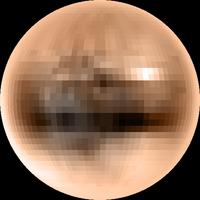In this post(link), I first mentioned a debate about whether Pluto should be called a planet.
Then in this post(link), I predicted that Pluto would one day lose its planethood.
 Well, that day has come. Pluto is no longer a planet.
Well, that day has come. Pluto is no longer a planet.Capping years of intense debate, astronomers yesterday resolved today to demote Pluto in a wholesale redefinition of planethood that is being billed as a victory of scientific reasoning over historic and cultural influences. But already the decision is being hotly debated.
"Pluto is not a planet," Astronomer Brown said. "There are finally, officially, eight planets in the solar system."
The decision establishes three main categories of objects in our solar system.
* Planets: The eight worlds from Mercury to Neptune.
* Dwarf Planets: Pluto and any other round object that "has not cleared the neighborhood around its orbit, and is not a satellite."
* Small Solar System Bodies: All other objects orbiting the Sun.
Pluto and its moon Charon are part of a sea of other objects that occupy the same region of space. Earth and the other eight large planets have, on the other hand, cleared broad swaths of space of any other large objects.
"Pluto is a dwarf planet by the ... definition and is recognized as the prototype of a new category of trans-Neptunian objects," states the approved resolution.
What is screwed up about the new definition is that "dwarf planets" are not planets under the definition.
The vote came after eight days of contentious debate amoung astronomers that involved four separate proposals at the group's meeting in Prague.
The initial proposal, hammered out by a group of seven astronomers, historians and authors, attempted to preserve Pluto as a planet but was widely criticized for diluting the meaning of the word. It would also have made planets out of the asteroid Ceres and Pluto's moon Charon. But not now.
"Ceres is a dwarf planet. it's the only dwarf planet in the asteroid belt," Brown said. "Charon is a satellite."
The category of "dwarf planet" is expected to include dozens of round objects already discovered beyond Neptune. Ultimately, hundreds will probably be found, astronomers say.
The word "planet" originally described wanderers of the sky that moved against the relatively fixed background of star.
Pluto, discovered in 1930, was at first thought to be larger than it is. It has an eccentric orbit that crosses the path of Neptune and also takes it well above and below the main plane of the solar system.
Recent discoveries of other round, icy object in Pluto's realm have led most astronomers to agree that the diminutive world should never have been termed a planet.
My kids will only learn about 8 planets.
1 comment:
I thought Pluto was a dog.
Post a Comment